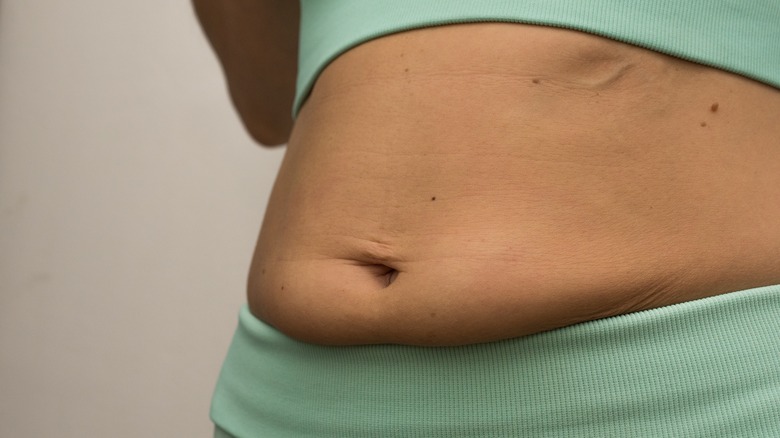How To Avoid Loose Skin When Losing Weight
If shedding some pounds is on your list of goals for this year, you may want to be aware of one of the surprising things no one tells you about losing weight — loose skin. While gradual weight loss may not affect your skin as much, rapid loss of weight could cause loose or hanging skin.
And for many people, this can be a source of self-consciousness and distress. For others, it may even pose a health risk, as explained by New York City dermatologist Dendy Engelman (via Harper's Bazaar). "After major weight loss, people may have skin that hangs off their body. These heavy folds can cause health problems such as pain, inflammation, and frequent infections from the skin constantly rubbing together," he explained.
While you should be proud of the weight loss journey you're about to undertake, you may want to avoid having excessive loose skin to deal with after you're done. If you're reading this article before you start the process, the goal is to space out your weight loss, according to the experts. While your age, genetics, lifestyle choices like smoking or not wearing sunscreen, how long you've been overweight, and how much weight you lose are all going to determine whether or not you end up with loose skin (via Healthline), pacing your weight loss journey with the help of nutritionists, fitness professionals, and even a dermatologist can help.
How to prevent loose skin while losing weight
You may feel like rushing to the finish line, but going slow and steady and taking even a year or more to gradually shed the pounds can be greatly beneficial for your skin. Dr. Davin Lim, a board-certified dermatologist living in Brisbane, Australia, shared via a YouTube video that a sensible goal would be to shed 2.2 pounds every six weeks. "Look at it as a long-term solution rather than a short-term fix. [Those] who are into yo-yo dieting with marked increases and decreases in weight, you're in for trouble," cautioned Dr. Lim.
The goal here is to give your skin enough time to adjust to the weight loss over time. By going for a more holistic approach to losing weight, you're basically working with your skin's collagen and elastin fibers, according to Healthline, and giving it enough time to adjust to each juncture of weight loss. Weight gain and weight loss have a significant impact on skin laxity. For example, someone who has been overweight for a long period of time could have damaged their skin's elasticity. So losing weight rapidly can only make things worse. According to certified personal trainer and author, Paige Waehner (via Verywell Fit), losing weight slowly can "help you lose more fat than muscle and allow your skin to adjust as you lose weight."
Also, pay attention to lifestyle choices — like drinking enough water, eating skin-nourishing foods, exercising regularly, wearing sunscreen, and quitting smoking — while on your weight loss journey, says Healthline. Your skin will thank you for it.
What to do about loose skin after weight loss
If you've gone through bariatric surgery or you've already lost a ton of weight and you're dealing with flabby skin, there are still some things you can be doing to lessen the appearance of it.
If you want to avoid non-surgical methods and want something natural, adding strength training and muscle building to your fitness regimen could help, per Men's Health. Again, you can also focus on good hydration and proper nutrition inclusive of plenty of protein, vitamin C-rich foods, omega-3 fatty acids, and even collagen supplements, which can also contribute toward skin elasticity and overall skin health, according to Healthline.
Non-invasive medical procedures could be something to consider as well — like radio frequency skin tightening. Using low-frequency electromagnetic waves can stimulate collagen and elastin production in your skin (via Cleveland Clinic).
But, as explained by New York City plastic surgeon David Shafer (via Harper's Bazaar), there is a limit to how effective these treatments can be, especially on hanging skin as opposed to loose skin. "Hanging skin generally needs to be surgically excised with procedures such as abdominoplasty, body lift, and arm lift," he explained. If you opt to go down this road, make sure you think really hard about the decision and consult with more than one plastic surgeon. The recovery time can be long and there could be complications. Plus, you may have to wait 1-2 years after weight loss to get the surgery.



